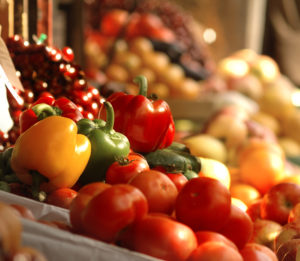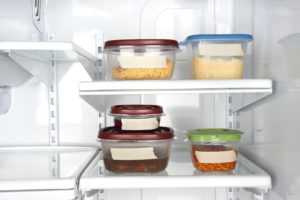Food waste is becoming a major problem among U.S. households for both the environment and your wallet. In an age when everyone is constantly busy, it’s easy to forget about a tomato here
Shop Smart
The best way to cut down on food waste is to not buy it in the first place. We have a few suggestions for not over shopping at the store. First off, always check your fridge and pantry to see if you have the ingredient. If you don’t, add it to the list. Also, be sure to include the recipe amounts with your grocery lists. We know what it’s like to get to the grocery store and not remember if you need one or two zucchini for that new pasta dish you want to try out.
Ease Up On The Servings
Overserving food is one of the biggest ways you can accumulate food waste. The solution is easy—plate with smaller servings. If you want to go back for more, you can! That way you don’t throw a bunch of food on the dish when you’re going to only eat half of it. Have family that have a tendency to have eyes bigger than their stomach? This Texas culinary school recommends you plate their food too.
Get Crafty With Leftovers
When recipes are usually sized for eight, leftovers are inevitable and we know how tiring it can be to eat the same thing for dinner four nights in a row. Here’s a solution—get creative! There’s a 
Tidy Up
The best way to end up with foul food is a messy refrigerator. Things get lost, pushed to the bottom or the back and forgotten about until that familiar smell start emanating from your ice box. You know the one we’re talking about. Keeping things tidy and organized is key to utilizing everything you have in there so you don’t let perfectly good food go to waste.
Guidelines Not Fact
There’s been a lot of talk lately about how sell by dates are more misleading than what we had thought. Not completely a deal breaker, they should be taken more as guidelines than a cold hard date. If you have a can that’s a month over its date, you can rest easy because it’s probably still good. If it’s a year over you can probably toss it. But same goes for bread, condiments or things like salsa or hummus. Unless there’s mold or it has a funny smell, it’s probably just fine. Don’t just toss something because that tiny printed date says so.
Freeze It
You would be amazed by all the things you can freeze. Not only is it another great option for leftovers, you can also use it to freeze other things that may be on their way out. Vegetables, fruit, 
Store It Right
There’s quite a few fruits and veggies that actually last longer when not refrigerated. Tomatoes, bananas, ginger, apples, pears—they all do better outside the ice box. Be sure to look up what fruits and vegetables need what for the best storage so you don’t buy something on Monday to use in a recipe for Friday and find that it’s already gone bad. We hate that feeling!
There’s Always Composting
For unusable food scraps, composting is a great way to make sure your bad food isn’t just ending up in a landfill. Composting uses things like wood shavings or shredded paper, soil and worms to create nutrient rich soil. It’s a bit of a commitment, but incredibly rewarding and a great project to do with children. You can learn more about composting here.



